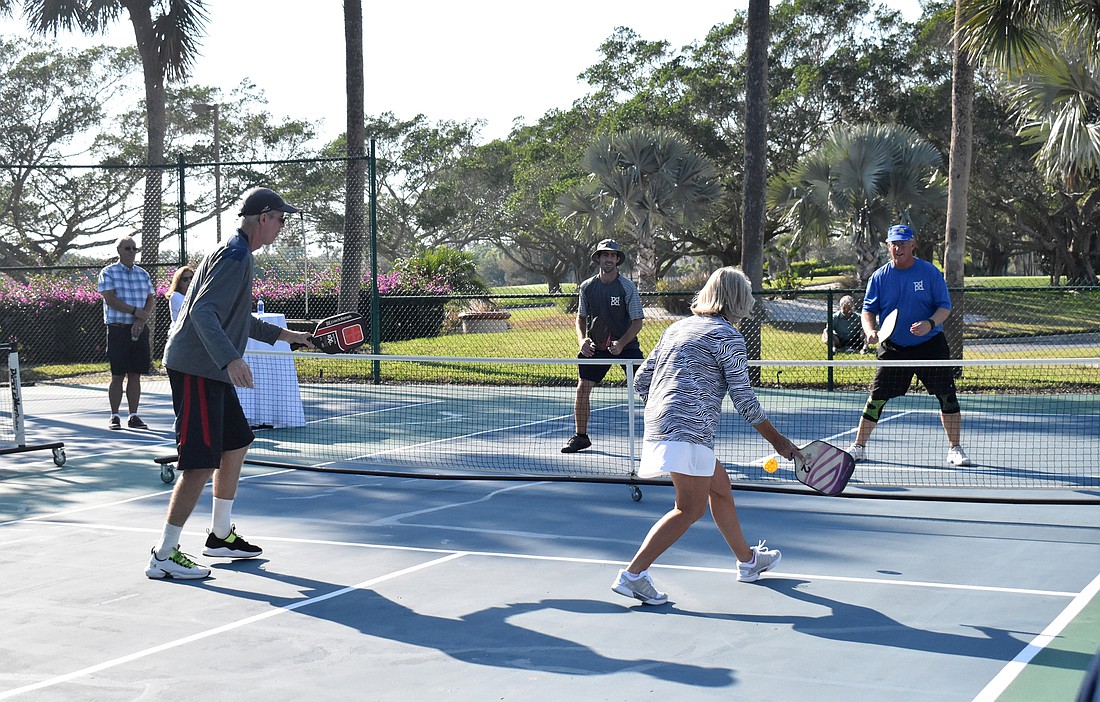- April 19, 2024
-
-
Loading

Loading

Players of pickleball play by a lot of rules unique to their sport.
But builders of pickleball courts play by the same rules as anyone setting out to construct a tennis court in Longboat Key. In other words, what rules apply to where and how a tennis court can be built and used also apply to pickleball . . . and pretty much every other racket sport out there.
In fact, once a court is built, the town’s rules and regulations don’t really care what lines are painted on it or what game is played on its surface.
That’s something the town has talked about since the spring, when the Planning, Zoning and Building Department began a series of updates of zoning code.
One proposed change working its way through discussion is the addition of the word “pickleball” alongside the word “tennis” in development standards.
“Obviously, there has been a lot of attention nationally and obviously locally here in the sport of pickleball,’’ said Allen Parsons, the town’s director of planning, building and zoning. “I’ll say that interest hasn’t necessarily translated itself into a lot of activity in terms of permitting.’’
In fact, zero applications have been submitted in the nearly two years since he’s been with the town.
The issue of sound, though, has been raised in Longboat Key and elsewhere. The sport, which originated in 1965 but has recently sprung up in popularity, employs a solid wood or composite paddle and a hard-plastic ball. One of its most persistent of the sport’s criticisms is the “popping” noise of play.
Parsons said there are no noise rules in town aimed specifically at any particular sport or rules that rely on specific decibel levels. “Our sound ordinance, I don’t think is a whole lot of help here in regulating pickleball,’’ he said, adding an exemption for recreation noise exists in areas open to the public, such as Bayfront Park.
And while Town Commissioners ultimately have backed away from delving into such noise-mitigation rules for now, the issue has reappeared from time to time.
Commissioner Randy Clair, in a workshop this month, reminded his colleagues that the town was concerned about sound mitigation when considering a recommendation to build pickleball courts near the Public Tennis Center, adjacent to a condo community and a church. A $16,000 line item for sound-deadening fencing was part of one proposal.
Mayor George Spoll said he was concerned about the possibility of a property owner building or converting a properly-permitted backyard court, and leaving neighbors with little recourse if a homeowners association lacked authority.
“Living with a tennis court clearly is different than living with a pickleball court,’’ he said.
Town Attorney Maggie Mooney told commissioners adding specific regulations for pickleball sound could become complicated, and the town had been down a similar road and decided against further action.
“I caution the commission on digging into the sound regulations might require a bigger bite of the apple than we’re prepared to talk about right now,’’ she said, adding the town in the past had looked into a decibel-based set of rules and found just the equipment alone could cost between $25,000 and $50,000. Parsons said, too, that it might be worth investigating whether pickleball noise rises past the level of typical municipal sound prohibitions.
“I do think it’s a challenge,’’ he said. “Here’s our standard . . . whether it’s the sound of ball hitting paddle or people hooting or hollering after a great play or something like that, is that unreasonable?”
Commissioner Mike Haycock and others said the issue of pursuing sport-specific sound regulations wasn’t immediately necessary.
Vice Mayor Ed Zunz said it never hurts to look toward the future, saying a distinction needs to be made, though he acknowledged sound-deadening fencing could raise concerns about aesthetics.
“They may be hard questions, but that doesn’t mean we can avoid them because they are hard,’’ he said. “I think we have to give more consideration to it.”